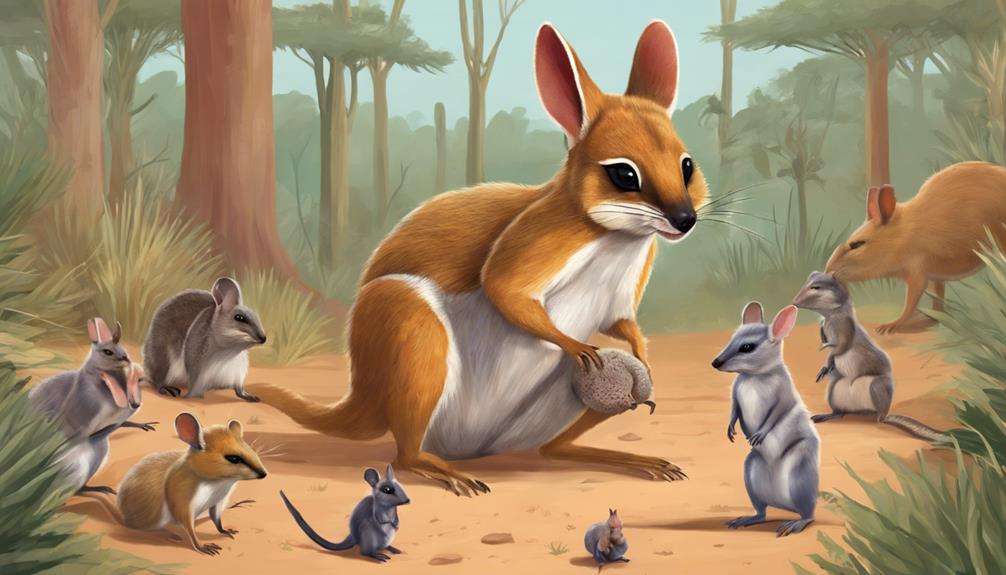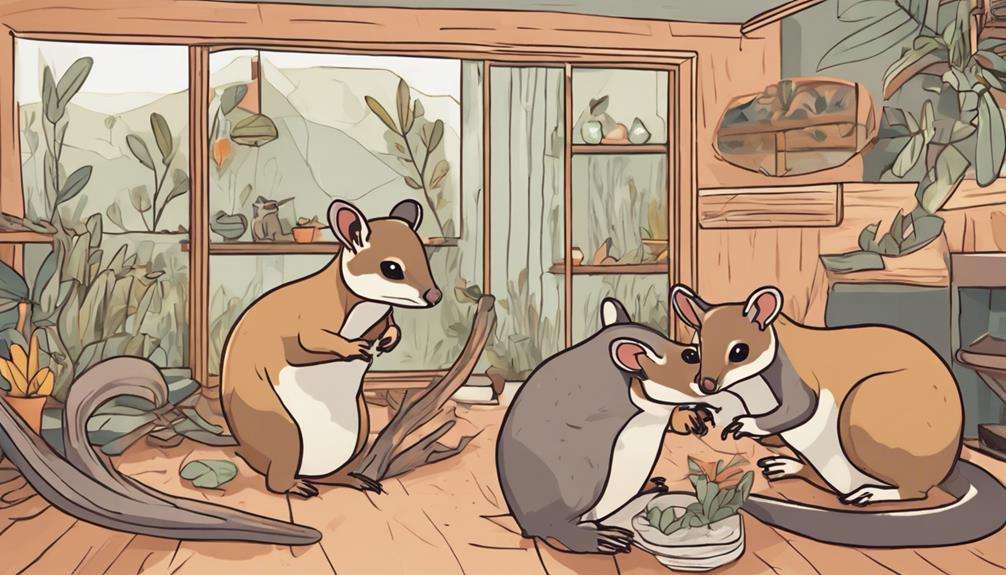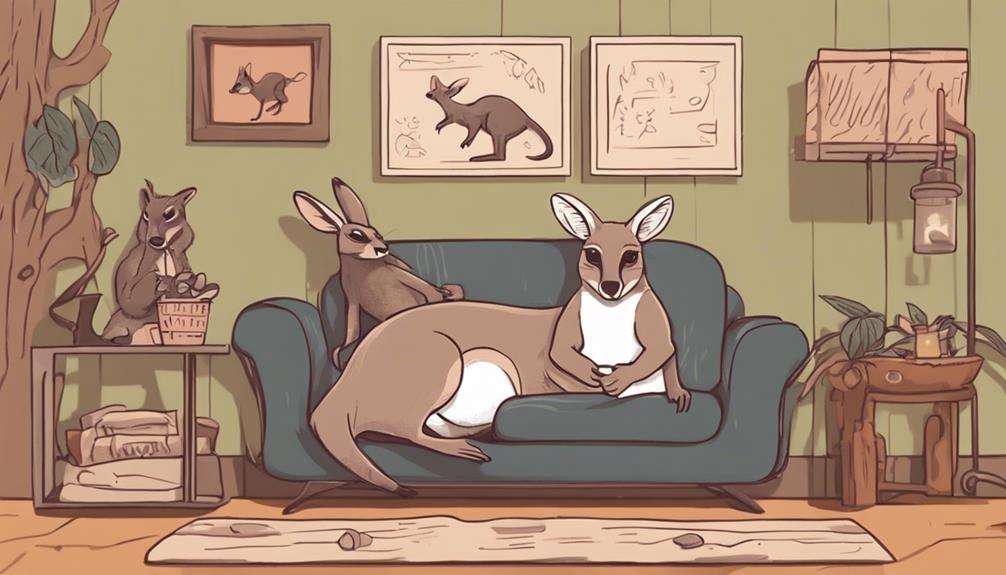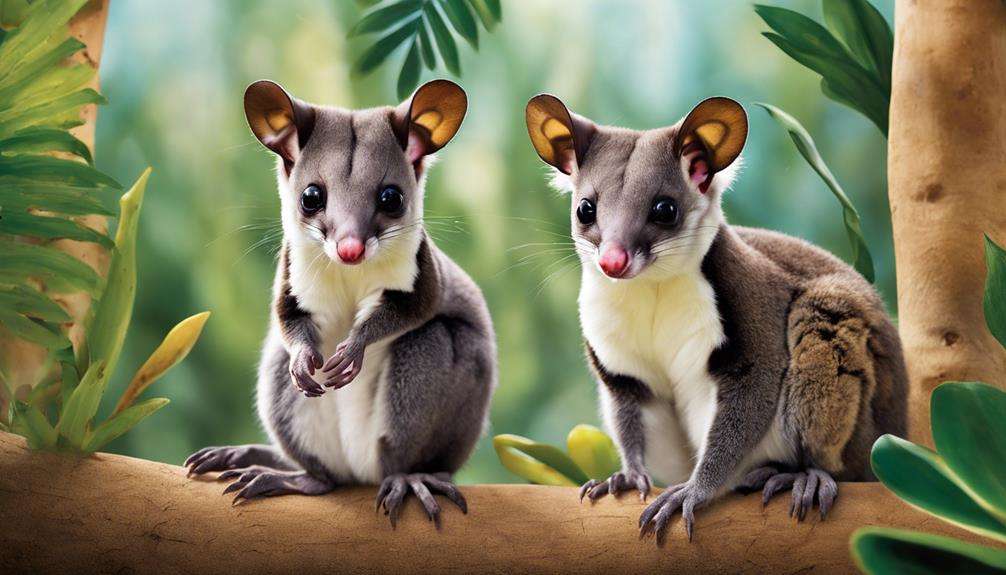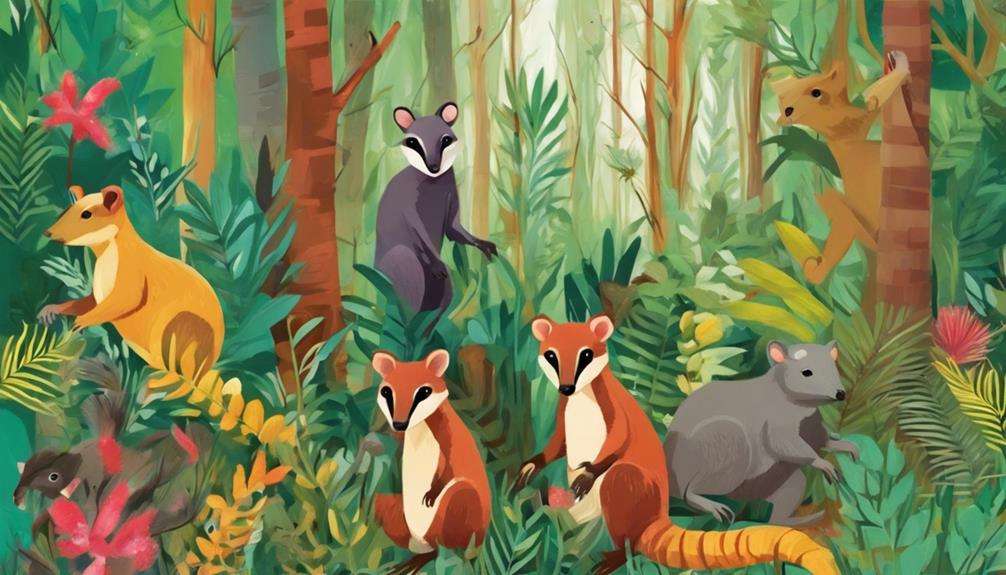Have you ever considered the fact that there are over 330 different species of marsupials, yet only a handful are commonly kept as pets?
By exploring the idea of keeping lesser-known marsupials as companions, you open up a world of unique experiences and opportunities that can enrich your understanding of these incredible animals.
Whether it's learning about their specialized care requirements or observing their fascinating behaviors up close, the decision to welcome a lesser-known marsupial into your home can lead to a deeper connection with the natural world and a chance to make a meaningful impact.
Key Takeaways
- Unique traits and behaviors offer fascinating insights into their natural behaviors.
- Legal considerations ensure responsible ownership and conservation efforts.
- Meeting dietary needs and providing enrichment aids in their physical and mental well-being.
- Proper health care, housing, and responsible ownership practices are essential for their welfare.
Unique Traits of Lesser-Known Marsupials
When considering the unique traits of lesser-known marsupials, it becomes evident that their specialized behaviors and adaptations are intricately linked to their ecological roles. Marsupials like quolls and bettongs possess distinct characteristics that make them fascinating additions to the ecosystem. Quolls, with their carnivorous nature, play a crucial role in controlling insect populations, contributing to a balanced ecosystem. Their nocturnal hunting behaviors and striking spotted fur patterns are unique traits that have evolved to aid in their survival and successful predation.
On the other hand, bettongs exhibit behaviors such as digging and foraging that are essential for soil health and seed dispersal. These small marsupials contribute significantly to maintaining biodiversity by aiding in the growth of vegetation through their foraging activities. Their unique traits have evolved over time to optimize their ability to thrive in their specific ecological niches.
Considering these distinctive features, keeping these native animals as pets can provide valuable insights into their behaviors, adaptations, and ecological importance. It offers a chance to appreciate and conserve these lesser-known marsupials while promoting education and awareness about their role in the environment.
Legal Considerations for Marsupial Ownership
When considering owning a marsupial, it's crucial to understand the legal framework surrounding their ownership. Laws regulating marsupial ownership vary by region, with permits often required for certain species.
These regulations aim to protect both the animals and the environment, ensuring responsible ownership practices.
Ownership Laws Overview
Understanding the legal requirements and regulations surrounding the ownership of lesser-known marsupials is essential for responsible pet ownership. When considering native mammals as pets, it's crucial to be aware of the ownership laws in your region.
Here are some key points to keep in mind:
- Ownership of marsupials as pets is regulated by specific laws and permits.
- Different states and countries have varying restrictions and requirements for owning lesser-known marsupials.
- Permits and licenses may be necessary to legally keep certain marsupials as pets.
- Violating ownership laws for marsupials can lead to legal consequences and impact conservation efforts.
Permits and Restrictions
To legally own lesser-known marsupials such as quolls and bettongs, obtaining permits is a mandatory requirement in Australia to ensure compliance with regulations. These permits are essential because native animals like marsupials are protected under Australian law, and ownership is regulated to safeguard both the animals and their habitats.
Regulations regarding marsupial ownership can vary between states and may include specific guidelines for housing, care, and conservation purposes. Some states impose restrictions on keeping certain marsupial species to prevent illegal trade and protect wild populations.
It's crucial to adhere to permit conditions and regulations to prevent exploitation, ensure the welfare of the animals, and support conservation efforts. Licensing authorities oversee the ownership of lesser-known marsupials to uphold legal standards and promote responsible pet ownership.
Lesser-Known Marsupials' Dietary Needs
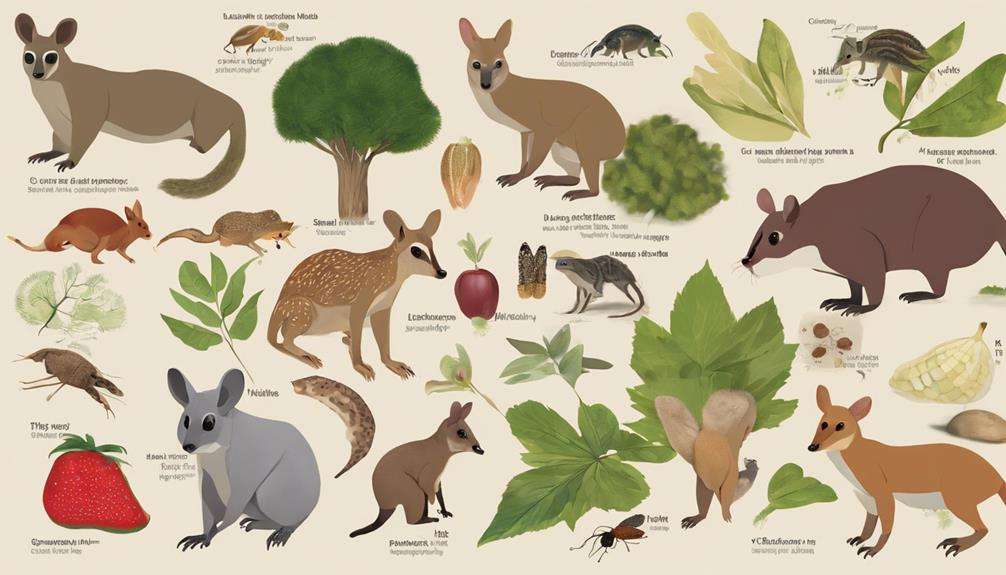
Lesser-known marsupials exhibit unique dietary requirements due to their diverse nutritional preferences. Some species are insectivorous, while others are herbivorous. Understanding these specific dietary needs is crucial for their adaptation to captivity and overall well-being.
To ensure optimal health, providing a balanced diet rich in essential nutrients, vitamins, and minerals tailored to each species is essential.
Unique Dietary Requirements
For optimal health and well-being, lesser-known marsupials such as quolls and bettongs require a diverse diet consisting of insects, fruits, and vegetables. When considering their unique dietary requirements, it's crucial to provide a balanced and varied menu to meet their nutritional needs effectively.
- Insects: Form an essential part of their diet, offering vital proteins and nutrients for growth.
- Fruits: Provide necessary vitamins and sugars for energy.
- Vegetables: Offer fiber, minerals, and additional nutrients crucial for overall health.
- Balanced Diet: Mimics their natural feeding behaviors, supporting their digestive systems and overall well-being.
Understanding and meeting these specific dietary needs are fundamental for ensuring the health, longevity, and quality of life of these unique marsupials.
Varied Nutritional Preferences
With their varied nutritional preferences, lesser-known marsupials like quolls and bettongs require a diverse diet to maintain optimal health and well-being. Quolls, native to Australia, are carnivorous and thrive on a diet rich in protein sources such as insects, rodents, and lean meat.
On the other hand, bettongs, also native to Australia, are herbivorous marsupials that prefer a diet consisting of fruits, vegetables, and leafy greens. Understanding the specific dietary needs of these exotic pets is crucial for their well-being in captivity.
Providing a balanced and species-appropriate diet tailored to the carnivorous nature of quolls and the herbivorous preferences of bettongs is essential when considering keeping these unique marsupials as pets.
Adaptation to Captivity
How can you ensure the optimal health and well-being of lesser-known marsupials like quolls and bettongs by meeting their specific dietary needs in captivity? It's crucial to understand their natural diet and provide a balanced nutrition plan that mimics their wild food sources.
Here are some key points to consider in adapting their diet to captive environments:
- Varied Diet: Offer a mix of insects, fruits, and vegetation to replicate their natural feeding habits.
- Nutritional Balance: Ensure the diet meets all their nutritional requirements to prevent deficiencies.
- Behavioral Enrichment: Create opportunities for foraging and feeding behaviors to stimulate their mental and physical health.
- Welfare Impact: Proper dietary management contributes significantly to their overall welfare and successful adaptation to captivity.
Marsupials' Social Behavior and Interaction
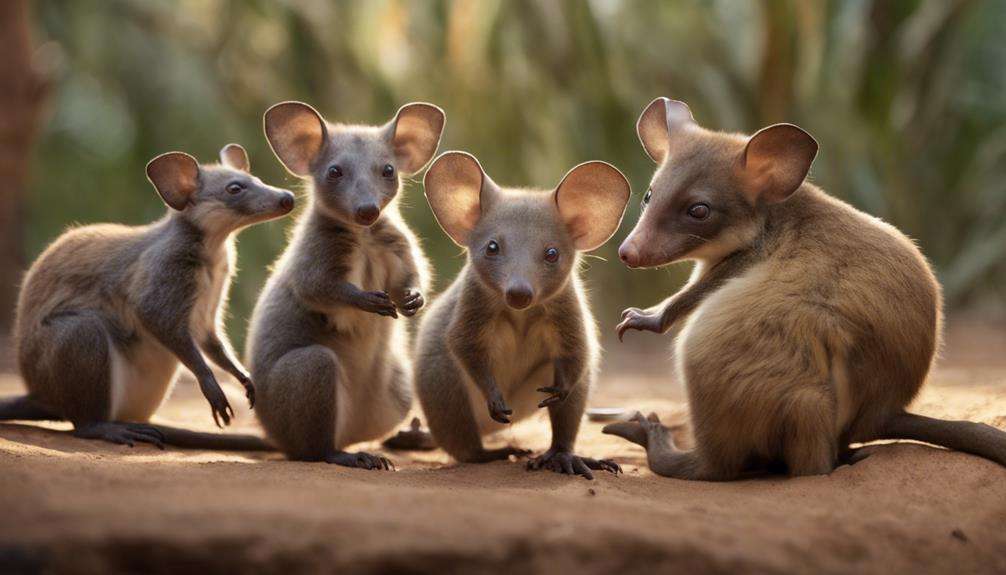
The intricate social behaviors of lesser-known marsupials, such as quolls and bilbies, encompass communication through vocalizations, scent marking, and body language. Quolls, typically solitary hunters, exhibit social interactions during mating seasons, while bilbies are known for forming strong family bonds and engaging in cooperative burrow-building activities.
Social interaction among these marsupials is vital for their survival and well-being, aiding in navigating their environment, locating food sources, and ensuring successful reproduction. Understanding the complexities of their social behavior not only sheds light on their conservation requirements but also guides efforts in captive breeding and reintroduction programs.
Enrichment Activities for Pet Marsupials
To ensure the well-being of your pet marsupial, engaging them in enrichment activities is crucial.
Offering a range of toys, puzzles, and foraging opportunities can stimulate their natural behaviors.
Interactive playtime and environmental enrichment are vital for preventing boredom and promoting your pet's physical and mental health.
Enrichment Toy Options
When considering enrichment toy options for pet marsupials, prioritize stimulating natural behaviors such as foraging and climbing to enhance their physical and mental well-being.
Here are some enrichment toy options to keep your pet marsupials engaged and happy:
- Puzzle Feeders: These toys challenge your pet to work for their food, simulating natural hunting behaviors.
- Foraging Balls: Fill these with treats to encourage natural foraging instincts and keep your pet mentally stimulated.
- Climbing Structures: Provide opportunities for exercise and exploration, mimicking their natural habitat.
- Interactive Treat Puzzles: These toys engage your pet's problem-solving skills and prevent boredom, promoting active play.
Remember to rotate these toys regularly to maintain your pet's interest and prevent habituation.
Interactive Feeding Ideas
Engage your pet marsupial's natural foraging instincts with interactive feeding ideas designed to stimulate mental activity and physical engagement. Consider hiding treats in puzzle feeders to provide enrichment during feeding time.
Vary their diet with different textures and tastes to keep your pet marsupial interested. Utilize foraging toys or interactive feeders to promote physical activity and prevent boredom.
Rotate feeding methods and schedules to mimic the unpredictability of finding food in the wild, encouraging your pet marsupial to stay active and engaged. By incorporating these interactive feeding ideas, you can help meet your pet marsupial's behavioral needs and ensure they lead a fulfilling life in captivity.
Habitat Enrichment Tips
Enriching the habitat of your pet marsupial with activities such as foraging puzzles and climbing structures can stimulate their natural behaviors and enhance their well-being. To create a stimulating environment for your pet, consider the following habitat enrichment tips:
- Provide hiding spots and nesting materials to enhance mental and physical well-being.
- Rotate toys and introduce new scents to prevent boredom and encourage exploration.
- Offer social interaction with owners and safe outdoor play areas to promote exercise and socialization.
- Include a variety of textures and materials for play and exploration to engage the senses.
Health Care Tips for Lesser-Known Marsupials
For optimal health maintenance of lesser-known marsupials like quolls and dunnarts, specialized veterinary care tailored to their unique needs is essential. These animals require regular health check-ups to detect and address any potential health issues promptly. Providing a balanced diet that meets the specific nutritional requirements of each species is crucial for their overall health. It's important to understand that lesser-known marsupials may have specific environmental needs, including appropriate temperature and humidity levels, that must be met to ensure their well-being.
In addition to veterinary care and nutrition, understanding the natural behaviors and social needs of these marsupials is vital for promoting their overall health in a captive environment. By providing a habitat that mimics their natural surroundings and allows for species-specific behaviors, you can help keep your pet quoll or dunnart healthy and happy. Remember, attentive care and a proactive approach to health management are key to ensuring the well-being of these unique marsupials.
Housing Requirements for Pet Marsupials

To ensure the well-being of your pet marsupials like sugar gliders, understanding and implementing the correct housing requirements is paramount.
- Enclosed Habitat: Pet marsupials, such as sugar gliders, need a spacious enclosed habitat that provides ample room for them to move around freely. Include places within the habitat where they can perch and hide to mimic their natural habitat.
- Mimicking Natural Habitat: Replicating the conditions of their natural environment within the cage is crucial for the mental and physical health of pet marsupials. This includes providing branches for climbing and safe hiding spots.
- Territorial Marking Behavior: Owners should be prepared for territorial marking behavior that pet marsupials may exhibit within their living space. Providing appropriate marking areas can help manage this behavior.
- Companion Introduction: If considering introducing a companion to your pet marsupial, do so cautiously to ensure compatibility and provide social interaction. This can be beneficial for the animal's well-being and mental stimulation.
Training Challenges With Marsupials
Training marsupials presents unique challenges due to their complex behaviors and specific social needs. When considering marsupials as pets, it's crucial to understand that traditional training methods used for more common domesticated animals may not be effective.
Marsupials like quolls and bettongs have distinct requirements for training and enrichment, requiring a tailored approach that factors in their individual personalities. Behavioral training for these lesser-known marsupials often involves positive reinforcement techniques to encourage desired behaviors. Patience, consistency, and a deep understanding of their natural instincts are essential when training marsupials.
Due to their unique behaviors, training sessions may take longer, and progress may be slower compared to training other pets. It's important to create a training environment that mimics their natural habitat to ensure their comfort and willingness to participate. By approaching training with dedication and a deep understanding of marsupial behavior, you can overcome the challenges and build a strong bond with these fascinating creatures.
Bonding Techniques With Lesser-Known Marsupials
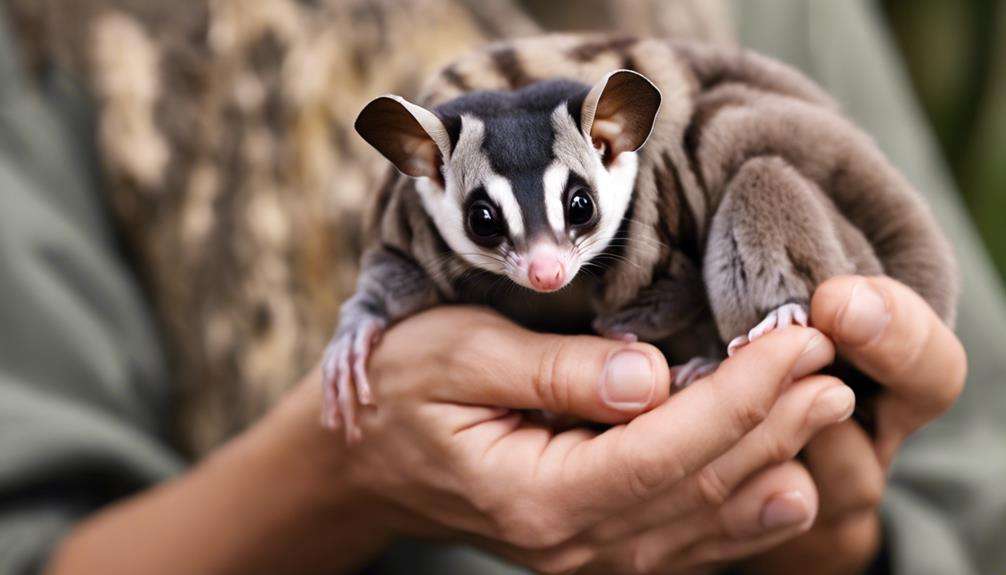
When fostering a bond with lesser-known marsupials, prioritize building trust through gentle handling and positive interactions. To deepen your connection with these unique creatures, consider the following bonding techniques:
- Quality Time: Spend time with your marsupial pet in a safe environment, allowing them to explore and interact with you. This quality time fosters a sense of security and comfort, strengthening the bond between you.
- Enrichment Activities: Provide your marsupial with enrichment activities like climbing structures and foraging opportunities. These activities stimulate their natural behaviors and provide mental stimulation, contributing to a closer bond with your pet.
- Reward System: Offer treats as rewards for good behavior or during training sessions. This positive reinforcement creates a positive association with you and strengthens the bond as your marsupial learns to trust and engage with you.
- Understanding Communication: Learn to interpret your marsupial's body language and communication signals. Understanding how they express themselves helps you respond appropriately, building a deeper connection based on mutual understanding.
Finding a Reputable Marsupial Breeder
A key indicator of a reputable marsupial breeder is possessing the necessary licenses and adhering to strict regulations governing the breeding and sale of native animals. Local pet regulations and animal rights laws are in place to ensure the ethical treatment and conservation of these unique species. When searching for a reputable breeder, it's essential to prioritize the well-being of the marsupials. A responsible breeder should prioritize the health, diet, and housing conditions of the animals under their care.
To find a trustworthy marsupial breeder, consider conducting thorough research, seeking referrals from other pet owners or animal organizations, and visiting the breeder's facilities. Ethical breeders will have a deep understanding of the specific needs and behaviors of lesser-known marsupials and will be dedicated to educating potential owners about proper care practices. By choosing a reputable breeder, you not only ensure the welfare of the animals but also support responsible breeding practices and contribute to the conservation of native marsupial species.
Frequently Asked Questions
Can You Have a Marsupial as a Pet?
Yes, you can have a marsupial as a pet. Legal considerations and care requirements are crucial. Ensuring appropriate diet, housing, and enrichment is essential. They offer a unique bonding experience and companionship, rewarding those willing to invest time and effort.
Why Shouldn't We Keep Exotic Animals as Pets?
You shouldn't keep exotic animals as pets due to animal welfare and ethical concerns. Conservation and habitat preservation are vital. Consider the well-being of these creatures and the impact on their populations before making decisions.
Are There Any Domesticated Marsupials?
Yes, there are domesticated marsupials. Exotic pets like sugar gliders are popular due to their unique traits. Legal restrictions vary, so research is crucial. Proper care, diet, and social interaction are essential for their well-being.
What Are the Pros and Cons of Having Exotic Animals as Pets?
Legal restrictions and ethical concerns surround the ownership of exotic animals. Care requirements and socialization challenges can be complex. Understanding the responsibilities and potential risks of having such pets is crucial for their well-being and your own.
Conclusion
In conclusion, considering keeping lesser-known marsupials as pets can offer a unique and educational experience for both you and others.
For example, imagine observing the intricate social interactions of a group of sugar gliders in your own home, providing them with enrichment activities and proper care.
This hands-on experience can deepen your understanding and appreciation for these fascinating creatures while also raising awareness about their conservation needs.
Start your journey with a lesser-known marsupial today!

